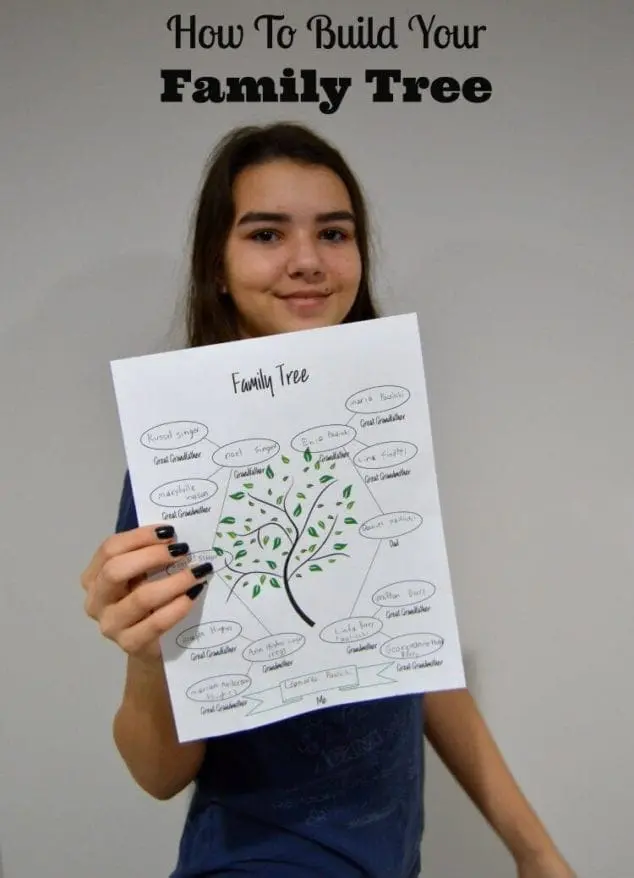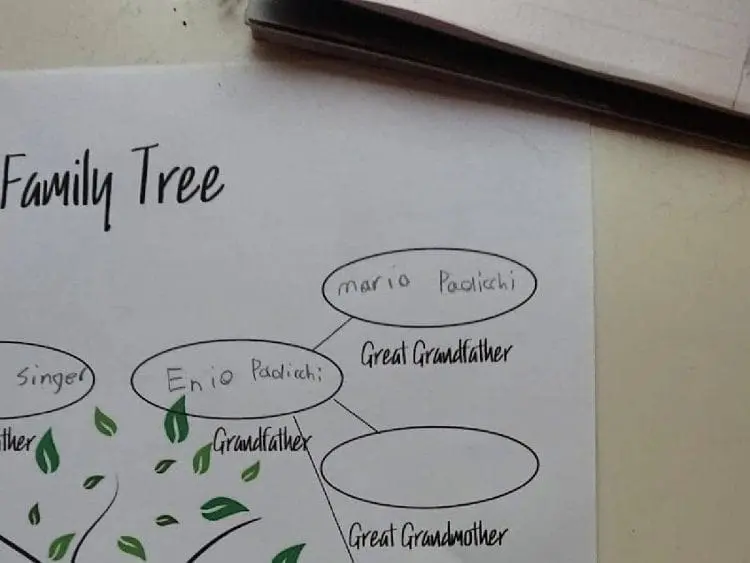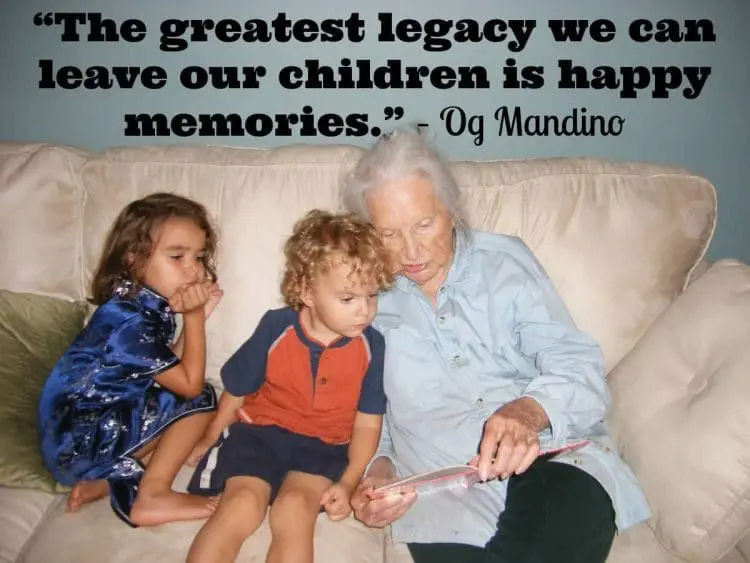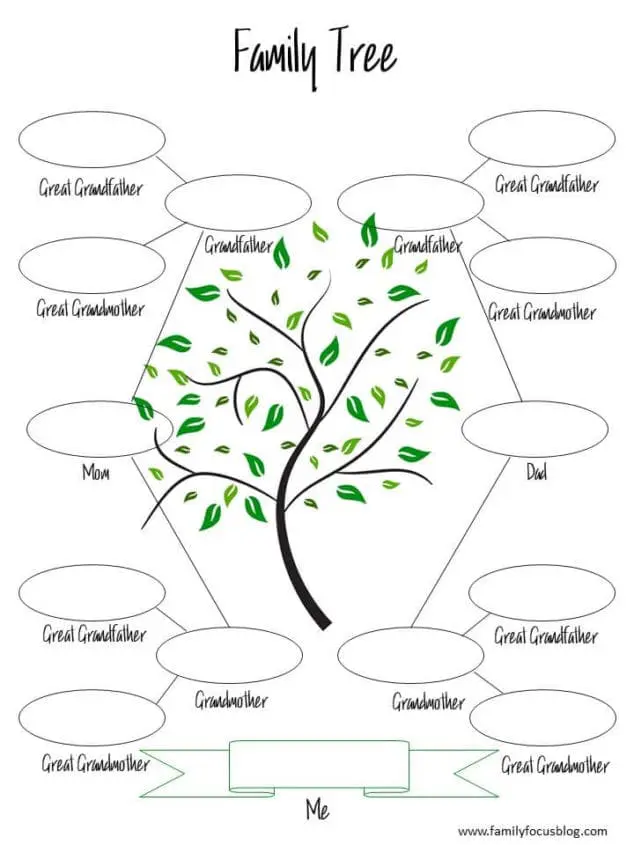At some point in your child’s elementary education they’re going to come home with a school project to build their family tree. I have included in this post a free family tree template printable that helps make it easy for kids to learn how to build your family tree. It’s a great way for kids to learn more about their family history and where they come from. Using this free family tree printable will make it easy to organize information. Genealogy is about learning who are ancestors are and sharing our family story.
Building your family tree together is a wonderful opportunity to tell your kids your favorite family stories. Share some of your best memories with the family members they’re just starting to hear about. Working with your child to build your family tree together can make for some memorable quality family time. There are so many ways to learn about our distant relatives. Here is a 6 step guide to get you started as well as a handy free printable blank family tree.

How to Make A Family Tree On Paper
Creating a family tree starts with gathering information on your family members, beginning with yourself and moving upward through parents, grandparents, and other ancestors. Record details like full names, birth and death dates, and relationships (such as siblings, spouses, or children). You can organize it by drawing a family tree on paper, use a family tree template printable, or opt for a digital tool like Ancestry.com or FamilySearch. Including photos, birthplaces, and marriage dates adds depth, creating a more vivid family history.

Gather Your Family Artifacts
As a first step, gather your family artifacts. This includes old photos, letters, newspaper clippings, journals, and anything else you may have hiding in the attic or garage. Find a place to work together where you can spread everything out, like the dining room table. Go through everything you’ve gathered and share stories with your child about the people in old photos or talk about the other memorabilia you’re holding on to.

Talk to Grandparents & Relatives
There are probably dozens of untold family stories that have never been brought up because there hasn’t been an opportunity or reason. Now’s the time to talk to your relatives and ask questions about family members you don’t know or never had a chance to meet. Your kids can write a list of questions and interview their relatives to get some background on their family. It is also fun to see what they know and don’t know when they go to fill out their blank family tree template.

Go Online
With so many genealogy websites available, you can find a wealth of missing information online. In addition to searching relationship information on your home computer, you can find birth and death records, newspaper clippings, and official government documents. Sites like ancestry.com make it fun to discover more about your extended family and family origins. They are also useful if you are trying to create detailed pedigree charts which shows which individuals have a certain genetic condition or particular feature. You may find that online genealogy research sites have information that goes back a number of generations. This far reaching information is useful for completing an ancestor chart as well. You can use the National Archives Catalog to search for digitized records.

Write A Family History
Write down all the pertinent information you already know; this will allow you to see where information might be missing. Once you know what’s missing, you’ll know where to focus your search, what questions to ask, and who to talk to. What may seem like a mundane family story now can actually become interesting and informative with time. Stories about family members are what make a family history captivating. This is a great activity for the grandparents that are sill living to be able to record stories that may soon otherwise be lost.

Fill In This Free Printable Family Tree Template
A generation family tree is the typical method most children use for their research as it is not too overwhelming. It includes 4 generations of family from the child to the great grandparents. This basic family tree design is also visually appealing to children. Organize all the information you find based on who they are, who they’re related to, and what generation they are. This way you can put together a complete timeline of your family history in a way that makes sense. You can use my printable family tree chart to help organize the information you have gathered and present it in a clear way. Don’t forget to include family names as well as first names. You may also wish to include date of birth and place of birth when known.
Use this free printable family tree just as it is and fill in full names. Or you can even add more detailed information to the chart including where the family member was from. You may also wish to decorate the blank family tree template by adding your favorite inspirational family quote to the bottom of the printable family tree template. You can then frame it. This makes a great keepsake of the work your child did in collecting the information to fill it out.
Download the printable family tree chart in pdf format above. This family tree diagram makes it easy to see the maternal family chart on the left and the paternal family chart on the right. Print a few blank family tree templates to give to relatives as well if you want to gather even more generation family trees. If you don’t want to print the family tree template right now, pin it for later!
How Family Trees Work
Family trees are often structured to record 3 generations in a family (grandparents, parents, children). They typically record the parents and all resulting children of each generation. They may go back as many generations as you can find the information to fill them out.
Obviously, the way family trees work is more difficult to organize on paper when the parents have multiple marriages and children from different parent groups. In this case you can do a simplified family tree. Start with just yourself and your parents and go back to each set of parents without recording siblings. This works better and is less complicated if you intend to go back more than 3 generations.
Share Your Research
No doubt your child will need to present their findings for their school assignment. Why not share your newly found wealth of family information with the rest of your family as well? Your parents, aunts, uncles, and cousins may not be aware of all the information you’ve accumulated about the family they come from. Send everyone a copy of the family tree template once it is filled out.
Put together a presentation of family history that you can share with your other family members. Who knows, it may spark a memory for them that had been long buried and can add to your family tree history. If your whole family does not live close by, you can have your child write a letter and mail it out with the printable family tree chart. Or it may be a great excuse to gather for a family reunion!
Conclusion
Completing a family tree is a rewarding journey that provides insight into your heritage and strengthens your connection to family history. Once your tree is filled with names, dates, and relationships, take a moment to verify the accuracy of each entry, especially for distant relatives or older generations where records may be sparse. Share your completed tree with family members for additional stories or corrections, as these can enrich your tree further. Preserving this family tree allows future generations to explore their roots and understand the legacy of their ancestors, making it a valuable keepsake for years to come.
I hope you found this free printable family tree template for your personal use helpful. Feel free to share it on social media for others to use too. Building your family tree can be a fun and interactive learning experience that you can share with your kids. It is one that you’ll both always remember. Share how your example family tree chart turned out with #familyfocusblog! How many generations of ancestors can you trace back?
Related Posts:

Daniel Chege says
Thanks for sharing the free printable family tree template that I can use to trace my roots.
Ramya says
This article is a great resource for anyone interested in tracing their family history. The free printable family tree template and tips on how to gather family history make it easy to get started. Discovering one’s roots can be a fascinating and rewarding experience, and this article provides valuable guidance on how to begin the journey.
Lucy says
This is a great resource. The printable family tree chart is so easy to use, and it’s a fun way to trace family history. Thanks for sharing this family tree template for kids!
Raven says
I absolutely loved your post with the family tree printable, how to fill out a family tree, and gathering family history! It really brought back some great memories of when I worked on a family tree project with my own kids. Your advice on gathering family artifacts and talking to relatives really hit home for me. We discovered so many family stories that had been forgotten, and my children had such fun interviewing their grandparents to learn about our roots.
The family tree free printable template you shared is such a fantastic resource too! I’ve used templates before, but this one is so easy to follow, and I love how you encourage adding photos and personal stories. It’s such a meaningful way to teach kids about their heritage. I’m excited to try this with my family and share the stories we uncover. Thank you for the helpful tips and the great printable! I can’t wait to get started on this project.
William says
Love this printable family tree chart! It’s such a great way to keep track of family history and share it with loved ones. Thanks for offering this!